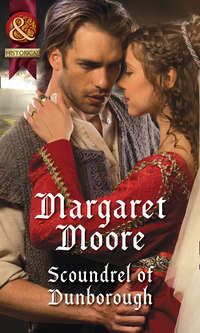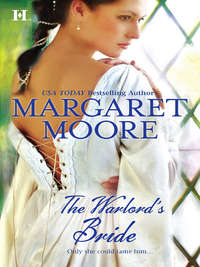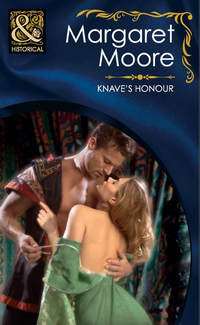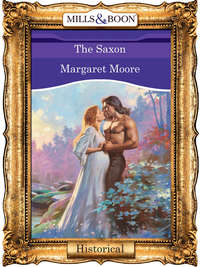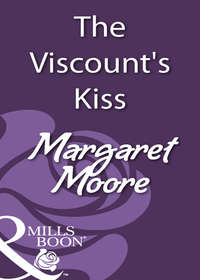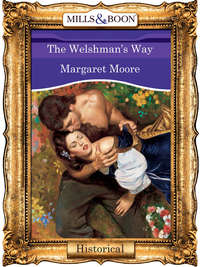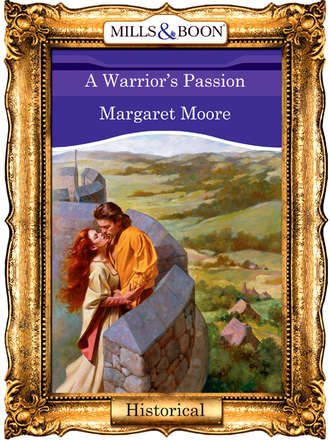
Полная версия
A Warrior's Passion

Table of Contents
Cover Page
Excerpt
Dear Reader
Title Page
About The Author
Chapter One
Chapter Two
Chapter Three
Chapter Four
Chapter Five
Chapter Six
Chapter Seven
Chapter Eight
Chapter Nine
Chapter Ten
Chapter Eleven
Chapter Twelve
Chapter Thirteen
Chapter Fourteen
Chapter Fifteen
Chapter Sixteen
Chapter Seventeen
Chapter Eighteen
Chapter Nineteen
Copyright
This one time, Seona’s heart commanded.
Just this one time to be with him. This one time to love him, fully and completely. This one time to grasp a life’s worth of happiness.
“Love me, Griffydd,” she pleaded fervently. “Love me now. Tonight.”
“We will be married,” he promised as he reached out for her.
She smiled at this honorable man who would not take what she was offering without some kind of promise between them.
“I will always be yours,” she replied softly, and truthfully, hoping it would be enough.
It had to be, for there was no more she could say.
“I love you with all my heart, wife-to-be,” he murmured, pressing feather-light kisses upon her forehead and cheeks. “I am yours forever.”
“Shh,” she hushed, afraid that if he called her “wife” again she would start to weep. “Later. We will speak of these things later.”
Even though she knew full well that there could be no later for them.
All they would ever have was this one time.
Dear Reader,
This holiday season, we’ve selected books that are sure to warm your heart—all with heroes who redefine the phrase “the gift of giving.” Since 1992, Margaret Moore has written seventeen full-length historicals for Harlequin and two short stories, and will soon publish her first historical for Avon Books, A Scoundrel’s Kiss. Look for it around Valentine’s Day. Critics have described her as “a master storyteller,” and “a genius of the genre.” In A Warrior’s Passion, the ninth book in her medieval WARRIOR SERIES, a young woman is forced into an unwanted betrothal before the man she truly loves—and whose child she carries—can claim her as his wife. Don’t miss this exciting story!
Linda Castle returns with the long-awaited sequel to Fearless Hearts, Territorial Bride, in which a cowgirl and an Eastern rogue must put their love to the test when she is thrown from a horse and seriously injured. The Shielded Heart by rising talent Sharon Schulze is the gripping tale of a warrior who learns to accept his special psychic gift as he teaches an enamel artisan about life and love.
Rounding out the month is Harrigan’s Bride by award-winning author Cheryl Reavis, who also writes contemporary romances for Silhouette. Here, Thomas Harrigan returns from the Civil War to marry the bedridden, abandoned daughter of his late godmother. It’s great!
Whatever your tastes in reading, you’ll be sure to find a romantic journey back to the past between the covers of a Harlequin Historical® novel.
Sincerely,
Tracy Farrell
Senior Editor
Please address questions and book requests to:
Harlequin Reader Service
U.S.: 3010 Walden Ave., P.O. Box 1325, Buffalo, NY 14269
Canadian: P.O. Box 609, Fort Erie, Ont. L2A 5X3
A Warrior’s Passion
Margaret Moore

MARGARET MOORE
confesses that her first “crush” was Errol Flynn. The second was “Mr. Spock.” She thinks that explains why her heroes tend to be either charming rogues or lean, inscrutable tough guys.
Margaret lives in Scarborough, Ontario, with her husband, two children and two cats. She used to sew and read for reasons other than research.
Chapter One
Seona MacMurdoch sniffled and wiped her dripping nose with the back of her hand. Clutching her thin woolen shawl tighter around her shoulders, she raised her head, squinting in the drizzle, and looked up at the slate-gray sky.
No sign of sunlight and, inside the stone hall beside her, not a sound that would give any notion of why her father had summoned her.
Unfortunately, there was nothing to be done but wait until the chieftain called for her or sent one of his men to fetch her inside, provided he even remembered that, at one time this morning, he had wanted her.
Breathing in the scent of the wet earth beneath her leather-covered feet and the soaked thatch above her head, she wiped her damp face again and sighed with resignation. Then she leaned back against the wall, the movement setting the iron keys tied to the plain belt around her thin waist jangling. Her gaze roved over the wooden wall of her father’s fortress to the scraggy hills surrounding the bay, the thin, dark green of them obscured by the rain. From where she stood, she could look out the open gate of the fortress to the harbor, where the trading ships of her father’s fleet rocked in the bay.
Although these were heavier, larger vessels than longships, the sleek hulls and curved prows gave evidence of Diarmad MacMurdoch’s Norse heritage. He and his people were Gall-Gaidheal whose forebears were both Scots and Norsemen here on the northwest coast of Britain.
His other ships—his longships—were moored elsewhere, out of sight of the village and any traders who might come to visit Dunloch.
“Seona!”
She jumped at the sound of her father’s bellowing voice. It echoed off the stone walls of the hall as if he had called from inside a cave.
Before she could obey her father’s order, however, the warriors of Diarmad MacMurdoch’s council filled the entrance, then filed out past her.
This was to be a private meeting? She shivered and told herself it was from the damp chill of the air of late spring, not the fear that she had done something wrong.
Clad in their voluminous yellow shirts called leine chroich whose color showed their wealth and status, cloaked against the cold and wet by brats, long, woven pieces of cloth they tucked into wide leather belts so that they hung to their naked knees like skirts, their shins wrapped with cuarans of deerskin held in place by thongs, the warriors paid little heed to their chieftain’s daughter as they passed her.
It was not that they didn’t notice her, standing there holding her cloak closed over her loose woolen gown without so much as a bronze pin for adornment, or would not be aware that the chieftain was awaiting her entrance. By their aloof behavior, they only emulated Diarmad MacMurdoch. He often went weeks without speaking one word to Seona, or seeming to realize she still lived and breathed.
Not that Seona wanted any of her father’s warriors to pay her particular notice. Around the time she had come of an age to be married, she had decided she would prefer to be ignored by the lot of them.
Nor had she any wish to see the dread in their eyes should fierce Diarmad MacMurdoch take it into his head to forge a family tie with one of them. She would rather remain a useless spinster, as her father so often described her.
Did any one of them ever wonder how she felt about the prospect of becoming his wife? Did they believe her blind to the curl of their lips when they glanced at her? Did they think her blushing face and awkward manner born in her, rather than engendered by the knowledge that all men thought her ugly and graceless?
“Seona!” her father bellowed again.
She obediently entered the cavernous hall. There were no windows, and the only ventilation came from the covered door and a hole in the thatched roof. A peat fire smoldered in the central hearth, and its lingering smoke added to the obscurity.
Despite the lack of light, she knew where her father would be, so she advanced confidently, as a blind person does in a familiar room.
Wrapped in his black bear robe, the chieftain of Dunloch sat on a bench at the far end of the hall, his back against the wall. A neck band of silver glinted dully as he stared at her with stern disapproval, his dark eyes glaring beneath brows as black as the fur surrounding him. His beard and hair, now shot through with gray, had once been that dark, too. Nevertheless, he was a dangerous man yet, despite his age, as his enemies would aver, whether in combat or in trade.
“You wanted me, Father?” Seona asked as she took off her cloak and shook out what water she could.
“I never wanted a daughter,” her father growled.
Seona made no answer as she folded her wet garment over her arm. This announcement did not surprise her; indeed, she had heard the same sentiment expressed many times before.
Her father leaned forward with a grunt. “You are the scrawniest woman I have ever seen.”
Seona carefully laid her cloak on a nearby bench. “I know,” she answered evenly, wondering how long this preliminary criticism would last.
Many a time he chided her for her pale face, oddcolored hair, staring eyes, too-large mouth, too thin body and too full lips. He claimed that she took after her mother’s family, which had only ever produced one woman worth looking at, the one Diarmad had taken for wife.
“Lucky for you, I may have use for you yet.”
“What task would you set me?” Seona inquired, thinking he was going to speak to her regarding provisions for his ships or food for his men.
His scowl deepened as he leaned forward again and fixed his beady black eyes on her. “We’re going to have an important visitor. From Wales he is, the son of a very powerful, rich baron. He’s coming to conclude a trade agreement.”
Seona nodded, thinking she knew what her father wanted. “I will see that quarters are prepared for him and his men.”
“He brings no men.”
Seona’s eyes widened a little, and then she smiled. Her chores would be much easier if the man came without a band of warriors.
“I’ve sent one of my ships to bring him here, and his father sends him alone to show his trust in me.”
Seona fought hard to keep any skepticism from her face. Her father’s reputation was not one to generate much trust among his trading partners.
Not that Diarmad MacMurdoch ever broke his word or harmed any ally. No, he was trustworthy as far as that went. But no one who made a bargain with him ever felt they got quite a fair deal, and in that, they were absolutely right.
“Very well, Father,” Seona said, turning to leave. “I will insure that all is ready.”
“There is more!”
Seona turned back to face her stern parent again. “Yes, Father?”
“You are to see that he is kept…happy…while he is with us.”
Her eyes narrowed as she regarded her father with a shrewdness his allies would have recognized. It did not ease her suspicions that her father did not meet her gaze. “What is it you would have me do?”
As the silence stretched between them, her instinct became a certainty and anger began to build in her breast.
“What would you have me do?” she repeated.
When he still did not answer, she squared her slender shoulders. “You would pander your own daughter for the sake of trade? I suppose I should be surprised that you have never made such a proposal before. However, I am not so ugly or desperate for a man’s touch that I will act a whore!”
“Did I tell you to sleep with the man?” her father retorted. “What have I asked of you except to see that my guest is made welcome?”
“I will see that his quarters are prepared as befits a valued ally,” she said firmly. “I will see that we have good food and drink to serve him—but no other needs will I fulfil.”
Her father shrugged his shoulders, and the scowl on his face was suspiciously like a pout. “You are not getting any younger, Seona,” he remarked, “and you’ve never been a beauty. You could do a lot worse than Griffydd DeLanyea. His father’s a powerful man, part Norman, too. Maybe if you—”
“Went to his bed, he would marry me?” She made no effort to hide her disgusted skepticism. “Father, who is it always says no man will buy what he can taste for free?” She wrapped her arms about herself. “Besides, I am not for sale, like furs or gold.”
Diarmad MacMurdoch regarded his only daughter coldly. “What is every marriage but a bargain? This would be no different. I’ve fed you and clothed you all these years, letting you live like a leech on my skin. It is time someone else took you.”
“You will offer me up like damaged goods?”
“If I must.”
“I am your daughter!”
“So what of that? I have sons to succeed me and fight for me. What will you ever do? Even if you marry, you will need a dowry—and where is that to come from, eh, but my purse?”
“I did not ask to be born!”
“No, and I did not ask for you, either!”
“I will not shame myself—”
Her father suddenly rose up like a wrathful spirit. “Do not speak of shame to me, girl! Have I not lived in shame these twenty years, aye, since the day you were born? Shame to have a daughter first! Shame that she was a weak, skinny thing! Shame that she was ugly! Shame that no man would have her, no matter how much I offered!”
Every word was like the sting of the lash to Seona, even if she had heard it all before.
Except the last. That was something new, and devastating.
“How much?” she asked in a whisper as cold as the wind from the hills in winter.
Now it was his turn to look startled. “Eh?”
“How much were you willing to pay someone to marry me?”
Scowling, he wrapped his robe about him and shrugged one shoulder morosely. “It matters not.”
“It does to me. I would know my worth.”
“Five hundred pieces of silver.”
And still no man wanted her! Dismay washed over her—and yet she would not give in to it, or to her father, either, just because no man of any wealth or consequence would take the bribe, for only to such would her father extend the offer. Otherwise, he would keep her by his side to run his household.
So it did not matter that a man of his choosing would not take her, she thought as she lifted her too-pointed chin.
“You should be glad I am here,” she said, “and that you have me to run your household. Am I not cheaper to keep than another wife would be? She might demand some notice from you, or lacking that, material goods to keep her happy.”
She ran a scornful gaze over her father, the chieftain of his clan, the leader of his people, the trader all men respected. Then she slowly and deliberately untied the ring of keys from her belt and held them straight out. “I learned better than to ask you for anything long ago. Would you have these back?”
“No!” her father growled.
“Then I will do my duty—but no more, not for you or any man!”
“Daughter—!”
“Servant,” she interrupted. “Little more than slave.”
“A servant would do her master’s bidding without an argument! A slave would know her place. By God, I should have drowned you like the runt of the litter.”
She regarded him steadily. “Aye, Father, perhaps you should have, but it is too late for that now. And alas for you, I am not a servant.”
With that, Seona turned on her heel and marched out.
Holding to the curved prow to steady himself in the bow of Diarmad MacMurdoch’s vessel, Griffydd DeLanyea drew in a deep breath of the salty air and gazed at the craggy hills of this godforsaken country. While Wales had hills and mountains aplenty, it also contained trees and lush valleys. All he could see here in the north was rock touched with a bit of green. Perhaps when the ship drew closer, the land would not look so barren.
Thank the Lord he didn’t have to live in the place, though. All he had to do was reach an agreement with Diarmad MacMurdoch, whose ships sailed all around Britain, the Isle of Man and Ireland, as well as north to the land of the Norsemen and Danes, and south to the Normans and even the Moors.
Griffydd’s father’s sheep produced some of the finest wool in Wales, and a lot of it. The baron’s tenants had also discovered silver in the hills near their castle of Craig Fawr. These two commodities would bring the family much wealth, if they could get it to several markets. Baron DeLanyea knew almost nothing about the sea and ships; better, he had told his son, to strike a bargain with a man who did and pay for his expertise.
“Yet have a care, my son,” his father had cautioned, “for a tricky man is Diarmad MacMurdoch. He will rant and rave and try to wear you down with his dramatics. That is why I send you, Griffydd. You have the patience to wear him down, with silence.”
As the ship turned toward the shore, Griffydd smiled sardonically at the memory of his father’s final words. Patience? Oh, yes, that he had—as well as the ability to overlook emotional outbursts, which he considered childish indulgence.
Indeed, he had always thought any display of extreme emotion rather distasteful and weak, even as a child. Like his mother, he could hide his feelings:
Not like his cousin and foster brother, Dylan. Dylan’s every emotion flew across his face and shone out of his eyes. There was nothing secretive about him, and no solemnity, either. He seemed to fall in love with a different woman every day of the week and clearly thought this something to brag about. He had already fathered three bastards that they knew of, and Dylan’s purse was perpetually empty supporting them and their mothers.
Being Welsh, of course, there was no shame to him or the women or the children—and yet no glory, either.
In Griffydd’s eyes, Dylan’s boisterous behavior was nothing more than rank foolishness and vanity. To be sure, Griffydd was no virgin, but he made no declarations of passionate, everlasting love to any woman. Why would he, when he never felt anything except the pleasure of physical union? No emotion had ever affected him the way the bards claimed love should. That such love existed he knew—his own parents were proof of that—but he mercifully had never felt the uncontrollable desire, the fierce longing that made all else unimportant, or the despair if the woman did not reciprocate.
The captain of the ship barked an order. Suddenly the crew jumped into motion.
They all had the look of the worst of Vikings about them, with long, tangled hair, thick, filthy beards and clothes that smelled as if their wearers had been living in them uninterrupted for the past ten years.
As the men lowered the square sail and prepared to out oars, the ship rounded a rocky point, exposing a sheltered bay. On one side of the bay on the top of a bluff stood a round stone tower that had obviously fallen into disrepair.
Inside the bay, several midsized vessels used for transport and trade sat at anchor. He could not see one longship, the low, dragon-prowed Norse warships all of Britain feared.
The captain pointed at the cluster of buildings now visible beyond the wharf at the edge of the bay. “Dunloch,” he called to Griffydd, who acknowledged his verification with a nod.
At the man’s next command, the oars slid out into the water. At his signal, the men began to pull in unison and, more surprisingly, sing.
At least Griffydd supposed that’s what they were supposed to be doing, for they started chanting rhythmically.
The reason became clear: it was to keep the men rowing in unison, the oars dipping and rising in time to the song.
As Griffydd hummed the tune, which was not difficult to learn, his shrewd, gray-eyed gaze swept over the village, noting the number of stone buildings, the wooden wall of the fortress on a slight rise beyond, the activity on the right side of the bay that bespoke both the building and repair of sailing vessels, the fish drying on the beach, and the women and children working and playing there. Smaller vessels were beside a wooden pier stretching out into the water, or drawn up on the rocky shore.
Dunloch seemed a very prosperous place, and Griffydd would remember that when Diarmad complained of the harsh winter, as he surely would.
The captain came to stand beside Griffydd. “You sing well,” he remarked, speaking the language that was common among men on the coast of Britain, a traders’ amalgamation of Gaelic, Norse and Celtic. “Must be the Welsh in you.”
“Perhaps.”
The man heaved a tremendous sigh. “A poor village, I’m afraid,” he said mournfully, gazing out over the water toward Dunloch. “It was a very harsh winter.”
Stifling a wry smile, Griffydd nodded his head, giving the man a sidelong glance. “Harsh in Wales, too, it was.”
“Oh, aye?”
Griffydd nodded. “There seems to be no lack of fish on the shore.”
The captain cleared his throat and ran a brown, brawny hand through his thick red beard. “That’s the way of it here. Good fish one day, no fish for ten.”
“A pity is that.”
“Aye,” the captain agreed.
“Tell me, are the chieftain’s sons in the village?”
A wary and yet relieved look came to the captain’s eyes. “No.”
Griffydd was glad to hear it, and he could understand the man’s response. Diarmad had six strapping, obstreperous sons who were known to treat everyone with arrogant contempt. They commanded their own small fleets, quartered out of six villages within a day’s sail of Dunloch. A wise plan to give them each their own village, Baron DeLanyea thought it, otherwise whelps like that would be at each other’s throats constantly.
A cry went up from a watchman on a rock near the shore, which was answered by the captain. Another call sounded in the village, and now Griffydd could make out more clearly the people on the shore.
And they would be able to see him. With that in mind, he made his way to his chest in the stern to don his mail, hauberk, finest cloak, best brooch and valuable sword.
As he did so, Griffydd DeLanyea felt no sense of foreboding, or fear that he would not be successful in his quest for a good rate for the transportation of his father’s goods. He truly believed that he would conclude this business and be safely home in no more than a fortnight.
Such is the folly of young men.
Chapter Two
As the ship slowly drifted into its place beside the wharf, the left-hand side closest to shore, Griffydd scrutinized the men assembled there.
The stocky one in the center wearing the fur robe would be Diarmad. Not only was he in the position of leadership, there could be no mistaking the man, to go by his father’s description.
The collective expressions of the men clustered around him indicated something less than joy at Griffydd’s arrival.
This did not surprise the young Welshman. Alliances, whether political or mercantile, were not something to be taken lightly. The political affected trade, and trade affected politics, so no transaction of the magnitude of the agreement Griffydd was going to attempt to negotiate could be a simple business.
Men in the bow and stern leaped from the ship to the wharf, carrying ropes to tie the vessel in place.




